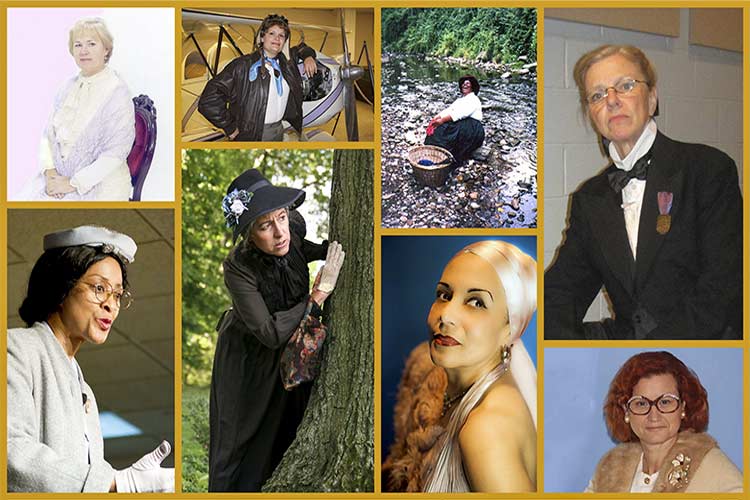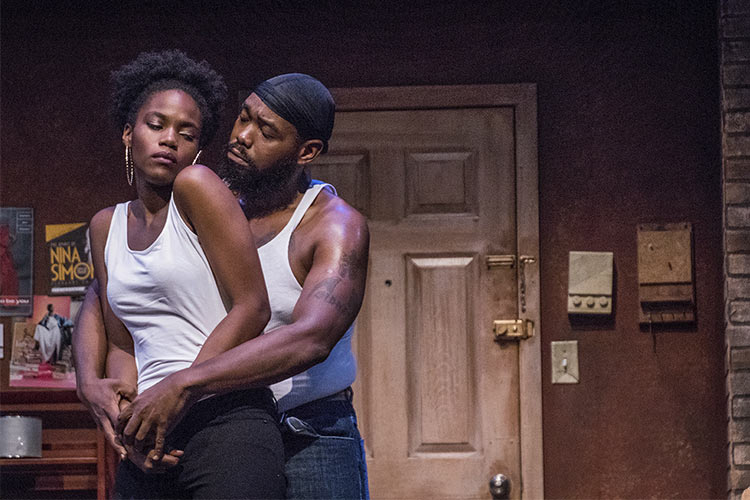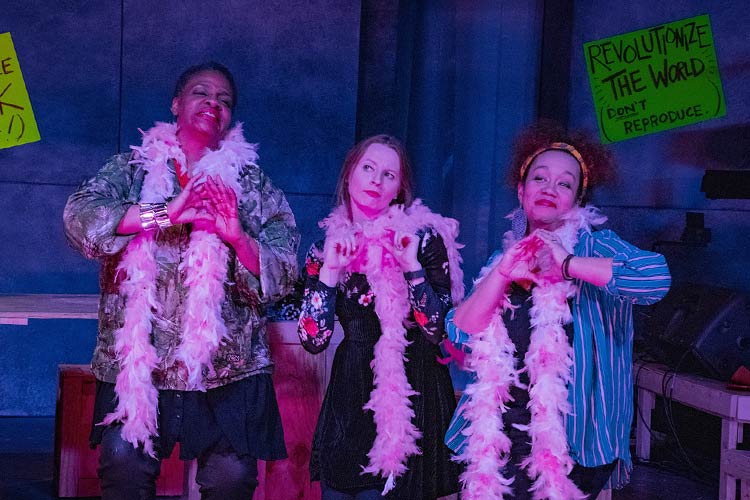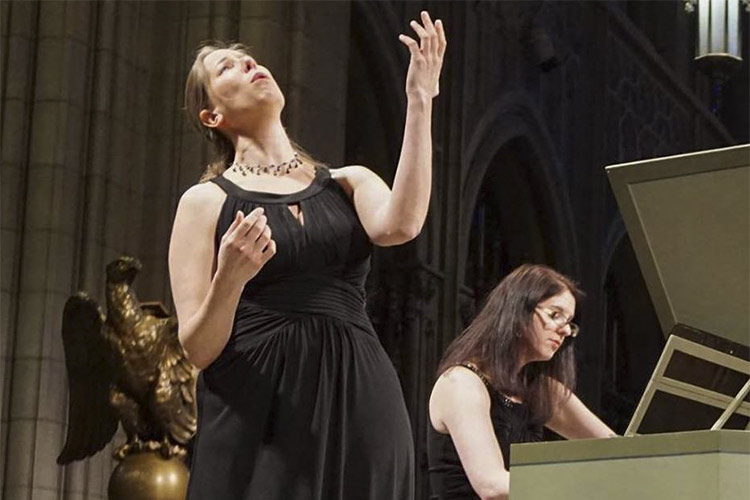Baroque music, pioneers in history & modern drama: CAC partners go big to celebrate women in March
March is Women’s History Month—a time to celebrate the achievements and contributions of women through the years. Many Cuyahoga Arts and Culture (CAC) partners are taking the month to heart with meaningful projects that spotlight iconic women through drama, music, and historical recreations.
FreshWater examines the works these organizations are creating and performing in celebration of women across Cuyahoga County.
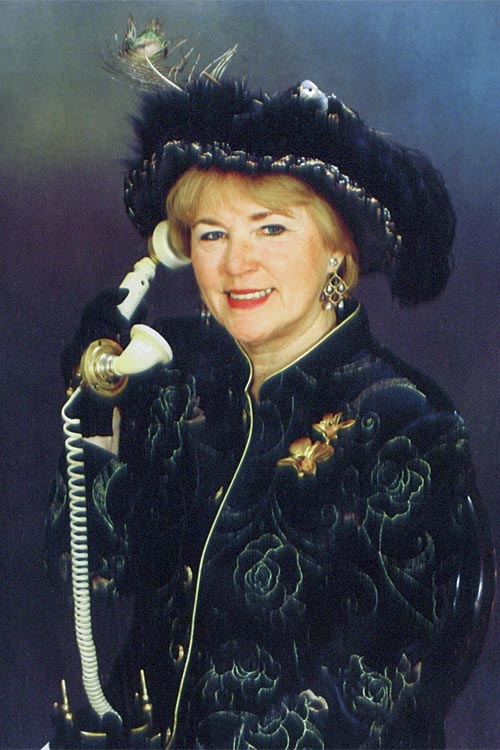 Women in History: Linda Witkowski as Hedda HopperLegacy in Lakewood: Women in History
Women in History: Linda Witkowski as Hedda HopperLegacy in Lakewood: Women in History
In 1991, a group of five women, led by historian Sophia Mastrandreas-Dadas, decided they owed future generations to tell the stories of famous women in history and share their knowledge that all things are possible.
Armed with Mastrandreas-Dadas’ collection of vintage women’s clothing, the five women attended a mother/daughter tea, dressed in character of their favorite women in U.S. history, and recited basic facts about them—when they were born, when they died, and the contributions they made—written on index cards.
With that Women in History in Lakewood was formed. “It went over so well, we were asked to do it again,” recalls Vernice Jackson, Women in History’s president and managing director. “The second time, we got rid of the index cards.”
Today, 11 members portray more than 130 notable women in American history—from the Unsinkable Molly Brown on the Titanic to Civil Rights activist Rosa Parks. They even portray beloved Cleveland Press journalist and WEWS-TV anchor Dorothy Fuldheim.
“Our members are made up of all walks of life,” Jackson says, adding that only one of the original five members is still active in the group. “The common thread is the love of history and wanting to share it. We’ve been going at it for 28 years, and we’re very proud of that.”
The group has performed in 20 U.S. states and around the world—from Civil War reenactments in Vermilion to various senior centers. They are also under contract with the U.S. Coast Guard for when new cutters named after female lighthouse keepers are launched. A $2,000 CAC grant makes such performances possible.
“We recognized years ago that an underserved audience was the senior community,” says Jackson. “They really enjoy these programs because a lot of times [these women were] prominent when they were younger.”
Jackson remembers being approached by one 90-something audience member after a Civil War presentation. "She said, ‘You just shook the hand that shook the hand that shook the hand of President Lincoln,’” Jackson recalls. “Her grandfather was wounded [in the Civil War] and was in the hospital. Lincoln came to visit him.”
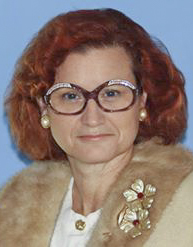
She tells of another audience member who remembered Annie Sullivan and Helen Keller visiting her school. “People come up and say they knew some of these women personally,” Jackson says. “We get back as much as we give.”
Jackson says that early in the group’s formation, characters like Annie Oakley and Harriet Tubman were popular with their audiences. “I’d say now first ladies and women involved in the suffragette movement are the most popular—and next year is the 100th anniversary of the women’s right to vote.”
The group size may ebb and flow over the years, but the mission remains the same. “I think initially people think we are a feminist group and only interested in presenting to women,” Jackson says. “We want people to understand the lives and times of these historic women that people don’t know anything about. We want people to walk away feeling that they actually spent time with that individual.”
This month, Women in History will be depicting characters such as Susan B. Anthony; Juliet Gordon Low; Mae West; Mary Todd Lincoln; Eleanor Roosevelt; Bessie Colman; Zora Neale Hurston; Dr. Mary Walker; and Josephine Baker, among others. Check Women in History’s monthly calendar for details and more information.
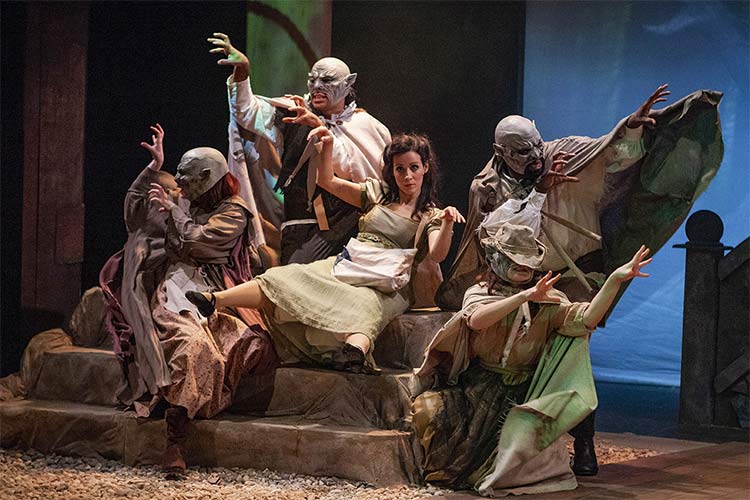 Dobama TheatrePowered by women: Dobama Theatre
Dobama TheatrePowered by women: Dobama Theatre
Since 1959, Dobama Theatre has produced innovative, forward-thinking plays that made the audience contemplate the themes. Often staging premieres coming out of Cleveland, the region, or even the national scene, the theater began in its original home on Coventry Road before a brief nomadic run in 2006 that included co-production work with Karamu House. Ultimately, the company moved to its permanent location in the Heights Library on Lee Road in Cleveland Heights.
The Dobama Theatre produces its thought-provoking plays thanks in part to a $37,954 operating support grant from CAC. “Each of our productions cost between $45,000 and $65,000,” says Dobama’s artistic director, Nathan Motta. “That support really goes a long way.”
The entire 2018-19 season at the Dobama features plays written by women. “Of the six shows, two are also directed by women, and all [productions] feature central women characters,” says Motta.
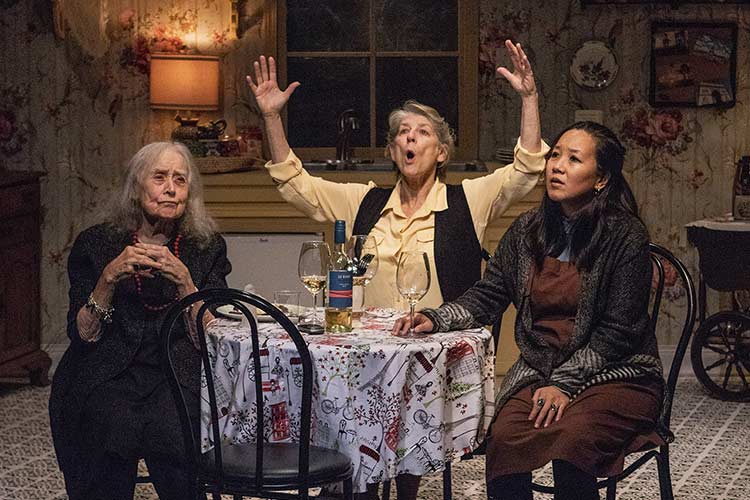 Dobama TheatreIt takes Motta between one year and 18 months to plan an upcoming season, and he says that while planning the current season, he noticed a lot of plays coming out of New York written by women, minorities, and members of the LBGTQ community.
Dobama TheatreIt takes Motta between one year and 18 months to plan an upcoming season, and he says that while planning the current season, he noticed a lot of plays coming out of New York written by women, minorities, and members of the LBGTQ community.
“Being cognizant of the #MeToo movement, it seemed like a good time to be intentional,” he says of his all-female decision. “Because Lord knows, there have been a continuum of all-white male playwrights. Let’s turn the tables and feature all women.”
Behind the scenes, Motta says this season has a good number of female and minority stagehands, stage managers, and crew. Being inclusive is just something that reflects the priorities of the community.
“It’s not something we do to be nice, or to get any kudos—it’s just how it should be,” Motta explains.
Onstage throughout March is “The Nether,” written by Jennifer Haley and directed by Shannon Sindelar. “It’s a futuristic criminal drama,” explains Motta. "[The plot's protagonist is] Detective Morris, [who] works in a department that investigates the nether—the next generation of the Internet. She is aware of a nefarious site geared toward men who want to interact with children, and she wants to shut down the service.”
“The Nether” runs Thursdays through Sundays through Sunday, March 31. Tickets can be purchased through the Dobama website.
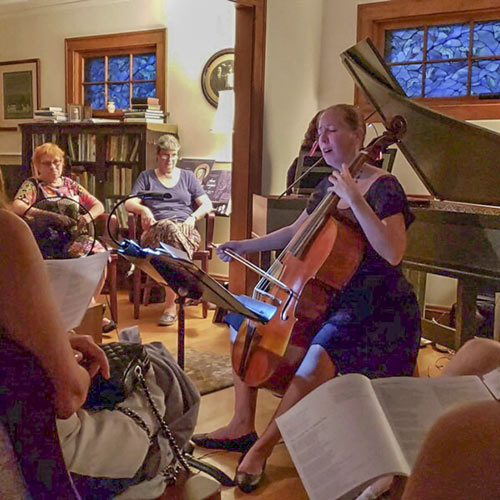 Burning River BaroqueBurn on: Burning River Baroque
Burning River BaroqueBurn on: Burning River Baroque
Since its founding in 2012, co-artistic directors Malina Rauschenfels and Paula Maust of Burning River Baroque have wanted to use the baroque music era of the 1600s and 1700s as a way to start dialogues about contemporary social issues.
The group’s name is just one example. “While the fire in 1969 hardly made local papers because the problem was so common, the Washington Post and Time picked up the story and it became a figurehead for environmental reform," says Rauschenfels, a soprano vocalist. "We passed the Clean Water Act and created federal and state environmental protection agencies.
Like the good that came out of the Cuyahoga fire, Burning River Baroque also looks at social issues from the past and highlights the resulting transformations in present-day life.
This season, Burning River Baroque is highlighting three female composers and tackling the woman’s perspective—fueled by a $5,000 CAC project support grant. “We probably have the highest percentage of female composers of any baroque group over the years,” says Rauschenfels.
The upcoming “The Other Side of the Story: Untold Perspectives on Familiar Tales”—a new baroque work for soprano, flute, cello, and harpsichord—examines history’s power imbalance toward the perspectives of those with privilege and power to shed light on characters whose viewpoints are underrepresented. The program features two female composers from the era, Barbara Strozzi and Anna Bon.
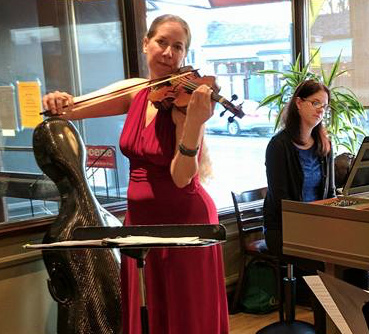 Burning River BaroqueDrawing from ancient mythology, literature, and Biblical passages, “The Other Side of the Story’s” dramatic music highlights modern issues and themes raised by the #MeToo campaign. From the Book of Judith (which is excluded from some canonical versions of the Bible) to the story of a Siren from her own perspective, Burning River Baroque shows the ways in which ancient tales resonate in our communities today.
Burning River BaroqueDrawing from ancient mythology, literature, and Biblical passages, “The Other Side of the Story’s” dramatic music highlights modern issues and themes raised by the #MeToo campaign. From the Book of Judith (which is excluded from some canonical versions of the Bible) to the story of a Siren from her own perspective, Burning River Baroque shows the ways in which ancient tales resonate in our communities today.
“We highlight underrepresented characters and emphasize issues raised by the #MeToo movement,” Rauschenfels explains. “For example, we begin with a piece by Élisabeth Jacquet de La Guerre. She was one of the only female French composers of the early 18th century who was able to publish her music under her own name.”
The program features Rauschenfels and Maust, as well as guest artists Sarah Lynn on baroque flute and Glenna Curren on baroque cello. They will also play a commissioned piece, by composer/librettist team Aaron Grad and Jennifer Bullis, telling the Sirens' side of the story. “We all know about the sailors, lured to their deaths by the evil Sirens, after all,” says Rauschenfels.
In addition to the concerts, Rauschenfels says part of the program will include an open poetry call as part of an artist residence with Fresh Perspectives. “The poetry call is loosely connected to #MeToo, and we’re reaching out to the LGBTQ, shelters, and youth centers,” she says. “Send us your poetry so we can hear your side of the story.”
Burning River Baroque will play five public performances. The first is Tuesday, March 19, at a house party in Fairlawn. RSVP and receive the address. The second performance, which includes the open poetry call and an artists’ discussion panel, is Wednesday, March 20, from 6:30 to 9:30 p.m. at Glo Cleveland (2460 Lakeside Ave.).
On Thursday, March 21, at 7 p.m. the group will perform at St. Alban Episcopal Church (2555 Euclid Heights Blvd., Cleveland Heights). On Friday, March 22, Burning River will perform at St. John's Episcopal Church in Youngstown before heading to Lakewood on Saturday, March 23, to perform at Lakewood Congregational Church (1375 W. Clifton Blvd., Lakewood) at 7 p.m.
More information is available here. All performances are free, but donations are accepted.


